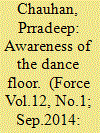|
|
|
Sort Order |
|
|
|
Items / Page
|
|
|
|
|
|
|
| Srl | Item |
| 1 |
ID:
133482


|
|
|
|
|
| Publication |
2014.
|
| Summary/Abstract |
As the world entered the last couple of decades of the 20th century, the sharply differing views and reactions of India and the United States (US) to unfolding global and regional events had brought bilateral relations to almost the nadir of the Nixon years. As James Heitzman and Robert L. Worden, the Washington-based editors of India: A Country Study have recorded (http://www.countrystudies.us/india/134.htm), "In the 1980s the Indian and United States governments had divergent views on a wide range of international issues, including Afghanistan, Cambodia, the Middle East, and Central America. Serious differences also remained over the US policy toward Pakistan and the issue of nuclear proliferation. India was repeatedly incensed in the Eighties when the US provided advanced military technology and other assistance to Pakistan despite the US' concerns about Pakistan's covert nuclear programme. For its part, Washington continued to urge New Delhi to sign the Treaty on the Non-Proliferation of Nuclear Weapons and, after the successful test launch of the Indian Agni intermediate-range ballistic missile in May 1989, called on New Delhi to refrain from developing a ballistic missile capability by adhering to the restrictions of the Missile Technology Control Regime". This unhappy prelude makes the vibrancy of the India-US bilateral defence relationship in general (and the maritime relationship in particular) over the very next decade all the more striking.
|
|
|
|
|
|
|
|
|
|
|
|
|
|
|
|
| 2 |
ID:
130069


|
|
|
|
|
| Publication |
2014.
|
| Summary/Abstract |
The proliferation of transportation-related technology and maritime users has created an opportunity to provide mariners with a whole new way of operating. U.S. waterways are shared by people who have a wide range of experience, training, and technology, from licensed commercial operators with years of experience, electronic charts, global positioning systems (GPS), radios, and radar, to unlicensed recreational boaters venturing on the water for the first time with little more than a handheld foghorn and a cellphone. While this diversity creates an imbalance that can threaten everyone's safety, all mariners have knowledge that could benefit the well-being of all if effectively shared in real time.
The real-time sharing of maritime operators' individual knowledge, combined with other sources of relevant information, creates an enhanced state of situational awareness we call "mariner situational awareness." This is the tactical cousin of "maritime domain awareness," which has come to represent a more strategic, wide-area, and therefore less time-critical awareness of the vast maritime domain. In today's complex maritime operating environment, rife with both safety and security risks, it is critical that we develop a system where maritime situational awareness is synchronized and shared across the full expanse of maritime users.
|
|
|
|
|
|
|
|
|
|
|
|
|
|
|
|
|
|
|
|
|